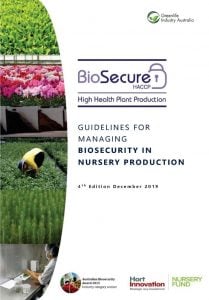Sustainable plant production requires the implementation of a sound and rigorous plant protection and biosecurity system to ensure the risks associated with endemic and introduced plant pests and diseases are minimised. This can be through exclusion or early detection, correct identification and effective management.
Nurseries within botanic gardens, especially those supplying plants to the public and other botanic gardens, have a critical role to play in implementing these kinds of plant protection and biosecurity systems. A robust and well-structured plant protection program operating in a nursery within a botanic garden will support the exclusion, detection and identification of both endemic and exotic pests.
The Australian nursery industry, through Greenlife Industry Australia (GIA) in partnership with Hort Innovation, has invested a significant amount industry levy funds in developing a range of resources to support production nurseries to address their plant protection and biosecurity risks.
Through the BioSecure HACCP program GIA has developed a very strong and rigorous plant protection and biosecurity program for production nurseries that has been created using the most up to date pest management science and technology. This program is even available to botanic garden nurseries, including those run by staff and friends.
The program provides growers with detailed procedures to implement across their cropping system from crop monitoring, site surveillance and import/dispatch inspections through to pesticide management, approved suppliers and disinfestation protocols. The system also has digitised recording templates that growers access via mobile phones to record activities. The data, including historical detections and actions, is stored online for growers to use later in pest reports.
The BioSecure HACCP system is designed to support growers to better provide information on pest pressures in their crop through frequent and repeatable crop monitoring activities inspecting a statistically valid sample size and recording the observations. This accurate and timely information gives growers the confidence to act whether it be to release biologicals at a low pest count or treat a hot spot in the crop with an insecticide due to localised high pest numbers. This also ensures that nurseries are not providing infected stock to customers.
The scheme also allows growers to ‘know’ what is not in the crop and therefore confidently declare freedom from pests not detected which supports their biosecurity needs. This will ensure that pests and diseases are not unwittingly being spread.
It is the first and only industry developed plant biosecurity scheme legally approved in Australia to provide participating businesses with a non-government interstate market access system. BioSecure HACCP certified businesses are able to self-certify plant consignments for compliance to interstate biosecurity movement controls, demonstrating the high level of pest management the program provides and allowing growers to meet their biosecurity obligations.
Whether it is a production nursery run by staff or a nursery run by growing friends there are biosecurity measures that need to be considered and managed to ensure that the spread and establishment of endemic and introduced plant pests and diseases are minimised.
Further information
- BioSecure HACCP crop monitoring procedure video (watch here)
- Biosecurity – what is it and what does it mean to the nursery and garden industry? (download here)
- BioSecure HACCP Guidelines for Managing Biosecurity in a Production Nursery (purchase here)


One comment, add yours.
Wade Tordoff
Hello I am the fuel manager at CBM a power company located in northern NSW that has two bio mass boilers
I am contacting you in regards plant heath certificates and the ability to be trained to issue them
please can you help me in this regard